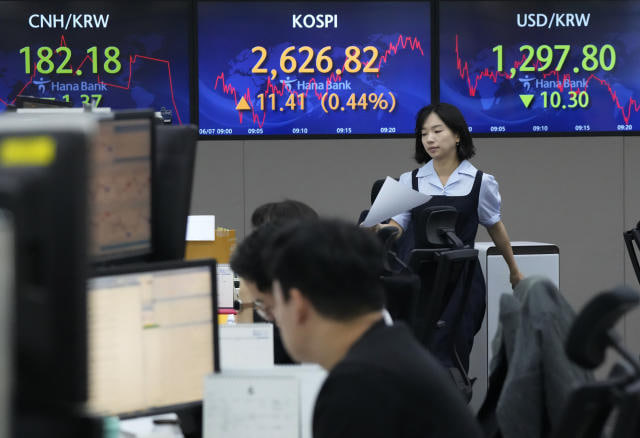China's Economic Pulse: Key Developments and Future Outlook
Meta Description: Dive into the latest economic updates from China, covering financial risks, market regulations, monetary policy, and key industry trends. Expert analysis and insights included. Keywords: China Economy, Financial Risks, Monetary Policy, Market Regulations, Economic Development, Consumption, AI, Gaming Industry, Ice and Snow Economy, Renewable Energy
This isn't just another news roundup; it's a deep dive into the beating heart of the Chinese economy. We're peeling back the layers, examining the intricate interplay of government policies, market dynamics, and emerging industry trends. From the crucial steps taken to mitigate financial risks and bolster the private sector to the exciting growth in sectors like AI and the ice and snow industry, we'll explore the factors shaping China's economic landscape in 2024 and beyond. Prepare to gain a nuanced understanding—not just the headlines, but the why behind them. We'll reveal the subtle shifts in monetary policy, the strategic implications of new regulations, and the opportunities presented by burgeoning technological advancements. Our analysis is not based on mere speculation; it's grounded in meticulous research, drawing on official government announcements, credible news sources, and expert opinions. This detailed exploration will equip you with the knowledge needed to navigate the complexities of the Chinese market, make informed decisions, and anticipate future trends. Buckle up—it's going to be a fascinating journey!
China's Financial Stability and Risk Mitigation
The recent National Financial System Work Conference highlighted the paramount importance of effectively managing financial risks and external shocks. This isn’t just lip service; it reflects a proactive approach to safeguarding the stability of the entire financial system. The emphasis on "orderly and effective" risk management suggests a carefully calibrated strategy, avoiding overly drastic measures that could disrupt the market but firmly addressing potential vulnerabilities. This speaks volumes about the government's commitment to preventing a systemic crisis—a key priority given the interconnectedness of the global financial system. The statement from the Central Financial Committee Office Director, He Lifeng, carries significant weight, emphasizing the need for steady growth across all sectors, including the capital market. This signals a focus on sustainable development rather than short-term gains. It's a mature approach, prioritizing long-term stability over rapid, unsustainable expansion.
The People's Bank of China (PBOC)'s report on M2 (broad money supply) showed a 7.1% year-on-year growth in November, indicating a fairly healthy level of monetary activity. This, coupled with the focus on supporting the silver hair economy (catering to the needs of the elderly population), further illustrates a multi-pronged approach to economic development. The government is not only looking at immediate growth but also tackling the challenges of an aging population, a trend that will have profound implications for the economy. The focus on diverse pension financing services and increased credit for businesses in the silver hair economy showcases a clear vision for sustainable economic growth that considers demographic changes.
Furthermore, the implementation of the personal pension tax incentive policy from December 15th, 2024, suggests a proactive approach to long-term financial security for individuals. This reflects a shift towards a more comprehensive social security system, encouraging personal savings for retirement. This kind of forward-thinking policy underscores the government's commitment to a more secure and stable future for its citizens.
Strengthening the Private Sector and Market Regulation
The upcoming 14th National People's Congress Standing Committee meeting, scheduled for December 21st-25th, will see the deliberation of crucial legislation impacting private businesses (for example, the revision of the Anti-Unfair Competition Law). This is a pivotal moment, demonstrating the government’s commitment to fostering a more supportive environment for the private sector. While there’s been some previous concerns, this focus reveals a commitment to a more robust and transparent regulatory system. The proposed amendments to the laws governing private business and anti-unfair competition reflect a continued effort to create a more level playing field, attracting both domestic and foreign investment. The focus on the rule of law, and specifically on clearer regulations, is crucial for bolstering confidence among entrepreneurs.
The extension of the Sino-US Science and Technology Cooperation Agreement for another five years (until 2029) is another significant development. This signifies a continued commitment to international collaboration, even amid geopolitical complexities. This is a remarkable sign of confidence in technological cooperation, despite any current political tensions. It implicitly underscores the mutual benefits derived from scientific exchange and underscores the importance of collaboration in tackling global challenges.
Boosting Consumption and Economic Growth
The success of the "trade-in" policy for consumer goods, generating over 1 trillion yuan in sales, is a concrete example of stimulating domestic demand. This program provides tangible economic benefits, revitalizing various sectors from automobile and appliance manufacturing to home improvement and the e-bike industry. The sheer scale of the trade-in program's success underscores the government's ability to effectively implement stimulus measures and boost consumption. This indicates that well-targeted policies can significantly impact economic activity.
Emerging Industries: AI, Gaming, and the Ice and Snow Economy
The strategic partnership between Google and XREAL, a leading Chinese AR glasses manufacturer, highlights the growing significance of the augmented reality (AR) market. This collaboration signals a major step towards the widespread adoption of AR technology, positioning China as a prominent player in this burgeoning sector. This move is far more than a simple business deal; it represents a significant strategic investment in the future of technology, and a clear indication of China's ambitions in the global tech arena. The potential of AI-powered glasses to revolutionize the smart wearable market is undeniable.
The Chinese gaming market continues its impressive growth, with revenues exceeding 3257.83 billion yuan in 2024. This continued expansion, despite regulatory scrutiny, underscores the resilience and adaptability of this industry. For investors, this suggests a sector with significant long-term potential, despite the challenges of increased competition and rising costs. The ongoing growth, in spite of regulatory pressures, suggests the market's ability to successfully navigate such obstacles.
Finally, the rapid expansion of the ice and snow economy, projected to exceed 10 trillion yuan by 2025, showcases the potential of leveraging national events (like the Beijing Winter Olympics) to drive economic growth. This is a prime example of how strategic investment can transform a niche market into a significant economic engine. The government's active role in supporting this industry through substantial financial incentives highlights its recognition of the sector's potential.
Digital Transformation and Small and Medium-sized Enterprises (SMEs)
The launch of the “Small and Medium-sized Enterprises Digital Empowerment Special Action Plan (2025-2027)” aims to accelerate the digital transformation of SMEs through AI innovation and data utilization. This comprehensive initiative reflects a forward-looking approach to economic growth, recognizing that SMEs are the backbone of the Chinese economy. By empowering SMEs with digital tools, the government aims not only to increase their efficiency and competitiveness but also to stimulate economic growth at the grass roots level. This represents a smart move to boost efficiency and productivity across a wide range of sectors.
Frequently Asked Questions (FAQs)
Q1: What is the government's main focus regarding financial stability?
A1: The government's primary focus is on preventing systemic financial risks through orderly and effective risk mitigation strategies across key sectors, ensuring stable and healthy economic development.
Q2: How is the government supporting the private sector?
A2: The government is actively supporting the private sector through legislative changes, fostering a more transparent and supportive regulatory environment, and encouraging private investment.
Q3: What are the key drivers of consumption growth in China?
A3: Initiatives like the consumer goods trade-in program are driving consumption growth, along with government policies aimed at stimulating domestic demand.
Q4: Which emerging industries show the most promise for future growth?
A4: The AI, gaming, and ice and snow industries are showing significant potential for future growth, driven by technological advancements and government support.
Q5: What is the role of digital transformation in China's economic strategy?
A5: Digital transformation is a cornerstone of China's economic strategy, aimed at empowering SMEs and boosting overall efficiency and competitiveness.
Q6: What is the significance of international collaboration in China's economic development?
A6: International collaboration, as evidenced by the extension of the Sino-US Science and Technology Cooperation Agreement, plays a crucial role in driving technological advancement and economic growth.
Conclusion
China's economic landscape in 2024 is dynamic, marked by a concerted effort to manage financial risks, foster private sector growth, and capitalize on emerging industry opportunities. The government's proactive approach, coupled with strategic investments and policy initiatives, positions China for sustained economic progress. While challenges remain, the country's commitment to long-term stability and innovative development paints a picture of continued growth and evolution in the years to come. Keeping a close eye on key policy announcements and industry trends will be crucial for anyone seeking to understand and participate in this exciting economic journey.



